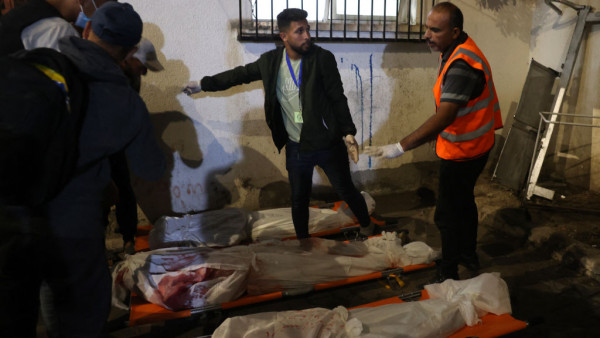Israel’s strike on a camp in Rafah killed at least 35 people, mostly women and children [Photo by EYAD BABA/AFP via Getty Images]
Gaza officials said Israeli strikes on a centre for displaced people killed dozens in a “massacre” near the southern city of Rafah on Sunday, while the Israeli army said it had targeted Hamas militants.
The health ministry in the territory said in a statement that the strikes “claimed the lives of 35 martyrs and left dozens injured, most of them children and women”.
The government media office in Gaza earlier said the strike hit a centre run by the UN agency for Palestinian refugees near Rafah, branding it a “horrific massacre”.
Israel’s army said its aircraft “struck a Hamas compound in Rafah”, killing Yassin Rabia and Khaled Nagar, both senior officials for the Palestinian militant group in the occupied West Bank.
It added that it was “aware of reports indicating that as a result of the strike and fire that was ignited, several civilians in the area were harmed. The incident is under review.”
Israel’s army said Sunday at least eight rockets were fired towards central areas of the country from Rafah, with strikes targeting the commercial hub of Tel Aviv for the first time in months.
Fighting has recently centred on Rafah, where Israel’s military launched a ground operation in early May despite widespread opposition over concerns for civilians sheltering there.
The Palestinian Red Crescent said its ambulance crews transported “a large number” of people killed and injured in the Rafah strikes.
The Palestinian presidency in the West Bank called it a “heinous massacre”, accusing Israeli forces of “deliberately targeting” the tents of displaced people.
Gaza’s civil defence agency said Israeli strikes killed and wounded at least 50 people in the area, where it said 100,000 displaced people live.
Hamas said Palestinians must “rise up and march” against the Israeli army’s “massacre” in Rafah.
‘Strong Palestinian Authority’
Netanyahu vowed to pursue the offensive ahead of a war cabinet meeting amid intense diplomacy to forge a truce and a hostage-release deal.
He has long rejected Hamas’s demand for a permanent end to the conflict triggered by the Palestinian militant group’s 7 October attack.
A senior Israeli official, speaking on condition of anonymity, told AFP the war cabinet would “discuss a hostage release deal” on Sunday.
Before the meeting, Netanyahu’s office said Hamas’s chief in Gaza, Yahya Sinwar, “continues to demand the end of the war, the withdrawal of the IDF (army) from the Gaza Strip and leaving Hamas in place, so that it will be able to carry out the atrocities of October 7 again and again”.
“Prime Minister Netanyahu strongly opposes this,” a statement said.
EU members Ireland and Spain, and also Norway, have said they will recognise the State of Palestine from Tuesday, drawing furious Israeli condemnation.
“In order to make peace, we need a strong Palestinian Authority, not a weaker one,” said the EU’s foreign policy chief Josep Borrell, who met in Brussels with Palestinian prime minister Mohammed Mustafa.
Mustafa, whose government is based in the occupied West Bank, said the “first priority” was to support the people in Gaza, especially through a ceasefire, and then “rebuilding the institutions of the Palestinian Authority” in the territory after Hamas seized it from the PA in 2007.
US President Joe Biden has pushed for renewed international efforts to halt the war, now in its eighth month.
The Israeli official had said Saturday that “there is an intention to renew these talks this week” after negotiations involving US, Qatari and Egyptian mediators stalled in early May.
Pressure on Israel
The 7 October attack on southern Israel resulted in the deaths of more than 1,170 people, mostly civilians, according to an AFP tally based on Israeli official figures.
Militants also took 252 hostages, 121 of whom remain in Gaza, including 37 the army says are dead.
Israel’s retaliatory offensive has killed at least 35,984 people in Gaza, mostly civilians, according to the Hamas-run territory’s health ministry.
As the war grinds on, the families of hostages still held by militants have piled pressure on Netanyahu to secure a deal to free them.
Washington has also taken a tougher line with its close ally as outrage over the war and US support for Israel has become a major issue for Biden, seeking re-election in a battle against Donald Trump.
Strikes on Tel Aviv
Hamas’s armed wing said Sunday that it targeted Tel Aviv “with a large rocket barrage in response to the Zionist massacres against civilians”.
“Hamas launched these rockets from near two mosques in Rafah,” Israeli military spokesman Rear Admiral Daniel Hagari said.
“Hamas is holding our hostages in Rafah, which is why we have been conducting a precise operation” there.
The United Nations has warned of looming famine in besieged Gaza, where most hospitals are no longer functioning.
Last Monday, the prosecutor at the International Criminal Court said he was seeking arrest warrants for Netanyahu and his defence minister as well as for three top Hamas figures.
And on Friday, the International Court of Justice ordered Israel to halt its Rafah offensive or any other operation there that could bring about “the physical destruction” of the Palestinians.

